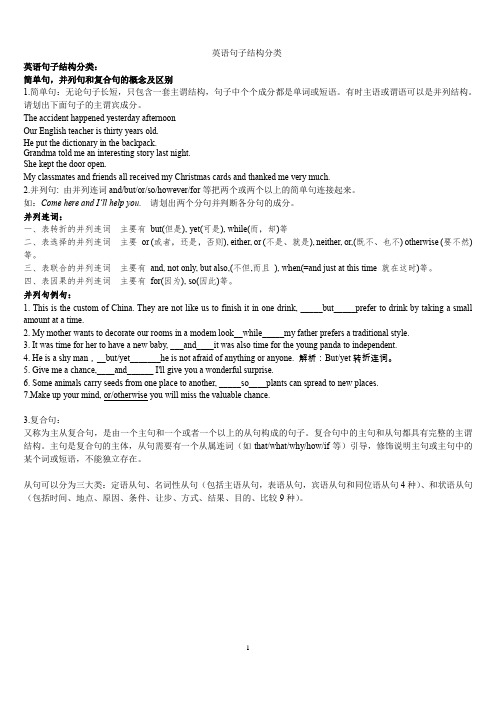英语简单句、并列句、复合句解析
英语五种句子结构

英语五种句子结构精选英文英语五种句子结构:英语五种句子结构解析1. 简单句(Simple Sentence): 这是最基本的句子结构,只包含一个主语和一个谓语。
例如:She sings beautifully. (她唱得很美。
)2. 并列句(Compound Sentence): 由两个或更多的简单句通过并列连词(如and, but, or等)连接而成。
例如:She sings beautifully, but he dances gracefully. (她唱得很美,但他跳得很优雅。
)3. 复合句(Complex Sentence): 包含一个主句和一个或多个从句。
从句不能独立成句,需要依赖主句来表达完整的意思。
例如:I know that she is coming tomorrow. (我知道她明天要来。
)4. 并列复合句(Compound-Complex Sentence): 这是由并列句和复合句结合而成的句子。
它包含两个或多个主句,其中至少有一个主句包含一个或多个从句。
例如:She sings beautifully, and I know that she practices every day. (她唱得很美,我知道她每天都练习。
)5. 省略句(Ellipsis): 这是一种不完全的句子,省略了某些词或词组,但在上下文中仍然能够理解其意义。
例如:Is she coming? (Yes,) She is. (她会来吗?是的,她会来。
)这五种句子结构在英语中非常常见,掌握它们对于理解和运用英语句子非常有帮助。
中文对照翻译:Analysis of Five Sentence Structures in English1. Simple Sentence: This is the most basic sentence structure that only contains onesubject and one predicate. For example: She sings beautifully (She sings beautifully.)2. Compound Sentence: It is composed of two or more simple sentences connected by coordinate conjunctions (such as and, but, or). For example: She sings beautifully, but she dances gracefully (She sings beautifully, but he dances gracefully.)3. Complex Sentence: Contains a main clause and one or more subordinate clauses. A subordinate clause cannot form an independent sentence and needs to rely on the main clause to express the complete meaning. For example: I know that she is coming tomorrow (I know she will come tomorrow.)4. Compound Compound Sentence: This is a sentence formed by combining a compound sentence with a compound sentence. It contains two or more main clauses, with at least one main clause containing one or more subordinate clauses. For example: She sings beautifully, and I know that she practices every day (She sings beautifully, and I know she practices every day.)5. Ellipsis: This is an incomplete sentence that omits certain words or phrases, but its meaning can still be understood in the context. For example: Is she coming? (Yes, she is.) These five sentence structures are very common in English, and mastering them is very helpful for understanding and applying English sentences.。
英语句子分类之简单句,并列句和复合句

英语句子结构分类英语句子结构分类:简单句,并列句和复合句的概念及区别1.简单句:无论句子长短,只包含一套主谓结构,句子中个个成分都是单词或短语。
有时主语或谓语可以是并列结构。
请划出下面句子的主谓宾成分。
The accident happened yesterday afternoonOur English teacher is thirty years old.He put the dictionary in the backpack.Grandma told me an interesting story last night.She kept the door open.My classmates and friends all received my Christmas cards and thanked me very much.2.并列句: 由并列连词and/but/or/so/however/for等把两个或两个以上的简单句连接起来。
如:Come here and I’ll help you. 请划出两个分句并判断各分句的成分。
并列连词:一、表转折的并列连词主要有but(但是), yet(可是), while(而,却)等二、表选择的并列连词主要or (或者,还是,否则), either, or (不是、就是), neither, or,(既不、也不) otherwise (要不然)等。
三、表联合的并列连词主要有and, not only, but also,(不但,而且), when(=and just at this time 就在这时)等。
四、表因果的并列连词主要有for(因为), so(因此)等。
并列句例句:1. This is the custom of China. They are not like us to finish it in one drink, _____but_____prefer to drink by taking a small amount at a time.2. My mother wants to decorate our rooms in a modem look__while_____my father prefers a traditional style.3. It was time for her to have a new baby, ___and____it was also time for the young panda to independent.4. He is a shy man,__but/yet_______he is not afraid of anything or anyone. 解析:But/yet转折连词。
初中英语句型讲解素材:简单句+并列句+复合句

简单句英语句子中基本成分:主语、谓语、宾语、表语、定语、补语、同位语、状语。
主语:动词的发出对象,由名词,代词,数词,人称代词,相当于名词的词/短语充当。
谓语:动词或者动词结构(助动词/情态动词+实意动词)宾语:动词的承受对象表语:通常在系动词(be/become/feel/sound/turn...)后面定语:用来修饰、描述主语或宾语,形容词通常做定语补语:用来补充说明主语或宾语同位语:即“同等位置”,以一个名词来解释说明另外一个名词或代词。
状语:表示时间、地点、原因、目的、结果、方式、程度等,副词通常做状语。
一、句型1——主语+谓语(不及物动词)句子的谓语,由动词充当。
主语+谓语,即构成一个最简单的句子。
I dance.She died.we agree.二、句型2——主语+谓语+宾语(及物动词)句型2在句型1的基础上多了一个宾语。
宾语,就是主语借助一个动作(谓语)作用的一个对象。
I hate him.I love you.I dance with her.三、句型3——主语+谓语+间接宾语+直接宾语在这个句型里,谓语后面跟了两个宾语,直接宾语,就是谓语动词直接作用的对象,而间接宾语,是指谓语需要先借助于一个间接的对象,再把动作传递到直接宾语身上。
如,I give him a book.(“给”,这个动作,最终作用的对象是“书”,但需要先通过“他”,把“给”这个动作传递到书)四、句型4——主语+谓语+宾语+宾语补足语相对于句型2,这种句型中又多了一个宾语补足语,“补足”意思就是补充说明,所以宾语补足语的作用,就是用来补充说明宾语怎么样了。
I want you to go with me.(我要你,要你干什么呢?to go with me,即要你跟我一些走,这个部分就是宾语补足语。
)注意,在这种句型中,补足语可能不是一个具体的单词。
五、句型5——主语+系动词+表语如何使用系动词。
表语,就是跟在系动词后面的成分的一个统称。
中考英语讲解:有关简单句、复合句和并列句的知识疏理

中考英语讲解:有关简单句、复合句及并列句的知识疏理1. 简单句:(1)定义:只有一个主语(或并列主语)和一个谓语(或并列谓语)的句子叫简单句,如:We learn English . 我们学英语。
(一个主语和一个谓语)Both Xiao Zhang and Xiao Wang are from Beijing .小张和小王都是北京人。
(一个并列主语和一个谓语)He once lived and worked here .他曾经在这里居住和工作过。
(一个主语和一个并列谓语)My father and mother go to work at seven in the morning and come back home at eight in the evening .我父母早上七点上班,晚上八点回家。
(一个并列主语和一个并列谓语)(2)分类:上次我们对简单句按照句子基本结构分出的5种类型做了阐述;另外,根据句子的功能或使用目的,简单句可分四类:陈述句、疑问句、祈使句、感叹句。
2. 并列句:(1)定义:用并列连接词连接起来的两个或两个以上简单句叫做并列句。
(2)并列句的构成:简单句+连接词+简单句(3)连接并列句常用的连接词:and , but , or , so , not only … but also , however , neither…nor , either…or , still等。
eg.I help her and she helps me . 我帮她,她帮我。
He is very old but he is in good health . 他年纪很大了,但他身体很好。
We must hurry or we’ll be late . 我们得赶快走,不然就晚了。
This girl did her work carefully , so she never made any mistakes .这个姑娘工作认真,从不出差错。
3.高中英语语法通霸什么是简单句并列句复合句

高中英语语法通霸3. 句子结构和成分句子分类简单句、并列句和复合句句子按结构可分为简单句、并列句和复合句。
考点1.简单句只有一个主语(或并列主语)和一个谓语(或并列谓语)。
如:He often reads English in the morning.Tom and Mike are American boys.She likes drawing and often draws pictures for the wall newspapers.(画线部分为并列谓语,只有一个主语,仍为简单句。
)改错:It not only costs little money but also comfortable.答案与解析:第一个谓语是实义动词,第二个是系表结构,应带be,因此要在also前加is。
考点2.并列句(参看P.错误!未定义书签。
错误!未找到引用源。
)改错:①.He likes English, his English is very good. ×②.His wife was ill, he had to stay at home. ×当一个句子中含有两个简单句时,就要考虑两个简单句的连接问题了。
直接用逗号连接两个简单句是错误的。
这时我们可以用and, but, or等并列连词来连接这两个句子;也可以用分号(;)来连接。
此时,这两个简单句(此时也可称作分句)之间是并列关系,不能说一个分句作了另一个分句的什么成分。
用并列连词或分号连接起来的句子是并列句。
上两句可以改为:①.He likes English;his English is very good. (用分号连接)He likes English, so/and his English is very good.②.His wife was ill; he had to stay at home. (用分号连接)His wife was ill, so/and he had to stay at home.考点3.复合句A.用从属连词连接的句子是复合句。
高考复习-简单句-并列句和复合句

像上面这样,用从属连词连接两个简单句之后, 一个句子是主要的(主句),另外一个句子(从 句)是说明主要句子发生的时间、原因、条件等, 这样构成的句子称为复合句。
C.一个句子如果含有从句,如名词性从句(主语从句、
宾语从句、表语从句和同位语从句)、定语从句和状语 从句等,这个句子就是复合句。
定)语从句
I don’t know where he comes from.(
宾)语从句
Where he was born is not known yet.(
主)语从句
This place is where they once lived.(
表语)从句
考点5 一个句子有两个主谓结构时,要 考虑它们之间的连接问题
Dad on the farm.
并列句
考点4 引导的是什么从句,不仅要根据连词,还要根据句 子结构和句意来判别
说出下列复合句中,where引导的是什么从句。
You can find it where you left it.(
状)语从句
Tell me the address where he lives.(
His wife was ill, so/and he had to stay at home.
考点3 复合句
A. 用从属连词连接的句子是复合句。
还先两个错句: He likes English, his English is very good. × His wife was ill, he had to stay at home. ×
5.Both Tom and Jack enjoy country复m合u句sic.
2023年中考英语语法笔记:简单句并列句与复合句
简单句(Types of Simple Sentences)1.主语+谓语(S+V) (谓语为不及物动词vi.)例:A. Class begins at eight o’clock. B. The sun rises in the east.C. The small boy can’t write.D. They are talking andlaughing happily.常见的不及物动词:listen, look, happen, go, come, arrive, work, stay, rise, talk等。
2.主语+谓语+宾语(S+V+O) (谓语为及物动词vt.)例:A. I couldn’t see anything.B. We raise our national flag every Monday.C. The small boy can’t write any words.D. They’re listening to the teacher carefully.E. I’ll tell her the news when she returns.注意:有些动词只做及物动词使用:reach, tell, show, hear, raise, teach, put等。
有些动词既做及物动词也可做不及物动词使用:write, know, open等。
不及物动词如要带宾语,须加相应的介词形成动词短语后再接宾语。
listen ( to) .laugh (at).wait (for).look (at),talk (to/with)等。
3.主语+谓语+表语(S+V+P) (谓语为连系动词Link v.)例:A. He was ill last week.(形) B. Keep quiet, please!(形)C. I feel very well today.(形)D. The mooncake tasteslike the pie.(介短)E. LiLei became a soldier.(名)F. The food has gonebad.(形)G. The bread feels hard.(形) H. LiLei fell ill lastMonday.(形)I. In spring, the weather gets warm and the trees turngreen.(形)注意:常见连系动词:1).be2). keep(保持), stay(保持), remain(保持) 等3).感官动词feel(感觉/摸上去),look(看上去),seem(似乎),smell(闻起来),taste(尝起来),sound(听起来),appear(看上去,显得)等。
英语简单句、并列句、复合句
名师手记之:英语篇(简单句、并列句和复合句)1.简单句、并列句和复合句① 句子种类两种分类法按照句子的用途,英语的句子可分:陈述句(肯定、否定)、疑问句(一般、特殊、选择、反意)、祈使句、感叹句等四种。
按照句子的结构可分:简单句并列句和复合句三种。
简单句只有一个主语或并列主语和一个谓语或并列谓语。
并列句由并列连词and, but, or,so等)或分号(;)把两个或两个以上的简单句连在一起构成。
复合句:含有一个或一个以上从句的句子。
复合句包含:状语从句\名词性从句(主语从句、宾语从句、表语从句和同位语从句)和定语从句等三种。
② 并列句的分类并列句指把两个同等重要的句子连接在一起,句子之间常用and, not only…but also…, neither…nor…, then等并列连词连接。
表示选择关系常用的连词有:or, either…or…, otherwise等表示转折关系常用的连词有:but, still, however, yet, while, when等。
表示因果关系常用的连词有:so, for, therefore等。
2.状语从句:(1)状语从句的分类状语从句通常修饰主句的动词或整个句子,由从属连词引导,从属连词在从句中不充当句子成分。
根据状语从句所表达的不同意义和功能,可分为时间、地点、原因、条件、目的、结果、让步、比较、方式等状语从句。
(2)连接状语从句的词语时间状语从句:when, whenever每当……,after, before, as, as soon as, hardly/ scarcely...when..., no sooner...than.。
.一……就……,while, till, until, since,once。
名词词组the first time第一次,last time最后一次,every/each time每次,the next time下次,the next day第二天, the moment, the minute, the second, the instant 一……就……;副词immediately, instantly, directly等也可作连词使用。
英语句型讲解
英语句型讲解一、句子的种类句子按其结构可分为简单句、并列句和复合句。
1. 简单句:只包含一个主谓结构的句子。
例如:She is smiling.2. 并列句:包含两个或更多主谓结构的句子,由并列连词连结。
例如:I like music, but she loves dance.3. 复合句:包含一个主谓结构,和一个或多个从句,从句由从属连词引导。
例如:I know the person who lives next door.二、句子的成分一个完整的句子通常包含主语、谓语、宾语、状语等成分。
1. 主语:句子中的主要人物或事物,是动作的执行者。
例如:The cat is playing with a ball. (主语是“cat”)2. 谓语:描述主语的动作或状态。
例如:The cat is playing. (谓语是“is playing”)3. 宾语:动作的承受者。
例如:I love reading books. (宾语是“reading books”)4. 状语:用于修饰动词、形容词或副词,表示时间、地点、方式等。
例如:She sings beautifully. (状语是“beautifully”)三、句型转换1. 肯定句与否定句的转换:在否定句中,通常使用否定词“not”或“no”,有时也使用“never”、“hardly”等否定意义的副词或形容词。
例如:She is not a student. (否定句)2. 陈述句与疑问句的转换:疑问句分为一般疑问句和特殊疑问句。
一般疑问句通常以“do”、“does”、“did”等助动词开头,特殊疑问句则以疑问词开头。
例如:Do you like music? (一般疑问句)3. 主动语态与被动语态的转换:被动语态的结构通常是“be + 过去分词”,其中“be”可以是“am”、“is”、“are”、“was”、“were”。
例如:The book was written by him. (被动语态)4. 倒装句型:将句子中的谓语提前到主语之前,称为倒装句型。
简单句、并列句和复合句的区别
简单句、并列句和复合句的区别在英语中,句子根据句子结构可以分为:简单句、并列句和复合句。
你知道要怎么区别简单句、并列句和复合句吗?接下来,店铺跟你分享简单句、并列句和复合句的区别方法。
如何区分简单句、并列句和复合句简单句、并列句和复合句的区别一、简单句当一个句子只包含一个主谓结构时,我们称之为简单句。
The train(主语) has just touched down(谓语).在英语中,最基本的句型大体上有五种。
1. S+Vi:主语+不及物动词She sat down beside me.2. S+V+P:主语+系动词+表语Mother isn't in at the moment.3. S+Vt+O:主语+及物动词+宾语I hope to finish the work today.4. S+Vt+OI+OD:主语+及物动词+间接宾语+直接宾语My uncle gave me a camera.5. S+Vt+O+C:主语+及物动词+宾语+宾语补足语The news made us sad.备注:S:主语Vi:不及物动词Vt:及物动词O:宾语OD:直接宾语OI:间接宾语C:宾语补足语二、并列句两个或两个以上独立的主谓结构或简单句并列在一起,我们称之为并列句。
各个简单句间是平行并列的关系,而非从属关系。
并列句的各个分句间可用逗号、分号、起连接作用的副词或并列连接词来连接。
1. 能连接并列句的连词and(和,又),but(但是),for(因为),however(然而),or(或者),so(所以,因而),while(然而),yet(然而)2. 能连接并列句的复合连词or else(否则,要不然),either...or...(要么···,要么···;或者···,或者···),neither...nor...(既不···,也不···),not only...but also(不仅···,而且···)3. 能连接并列句的副词besides(而且,还有),hence(因此),otherwise(否则,要不然),then(然后,于是),therefore(因此,所以),thus(因而,从而) 根据并列分句之间的不同关系,并列句则可以分为以下四种。
- 1、下载文档前请自行甄别文档内容的完整性,平台不提供额外的编辑、内容补充、找答案等附加服务。
- 2、"仅部分预览"的文档,不可在线预览部分如存在完整性等问题,可反馈申请退款(可完整预览的文档不适用该条件!)。
- 3、如文档侵犯您的权益,请联系客服反馈,我们会尽快为您处理(人工客服工作时间:9:00-18:30)。
英语简单句、并列句、复合句解析简单句、并列句和复合句考点一简单句1. 简单句只包含一个主谓结构.2. 五种简单句:1) 主+谓. He comes at last.2) 主+系+表. She is a teacher.The soup tastes nice.3) 主+谓+宾. They reached the village.4) 主+谓+间宾+直宾.He gave me a pen.5) 主+谓+宾+宾补.I find that book very useful.考点二并列句并列句:两个或两个以上的简单句,用连词连接起来。
常用的连接词有:1. 表示顺承关系的:and, not only…but also(不仅….而且….)等。
She ______ gave us a lot of advice, _______helped us to overcome difficulties.Linda tried to become an excellentteacher, _____ at last she succeeded.2. 表示选择关系和否定条件的有or(还是,否则)Do you want to leave now ____ would yourather set off later?Wear your coat, ____ you’ll catch a cold.3. 表示转折关系的有but, yet等。
He is young, but he works hard.虽然他年轻,但工作努力。
4. 表示因果关系的有for, so 等。
My leg hurts so I go to see a doctor. 我的腿疼,因此我去看医生。
考点三主从复合句:宾语从句1. 宾语从句的引导词(1)引导陈述句用that(在口语和非正式文体中常常省略)He tells me (that ) he is going shopping thisSunday.(2) 引导一般疑问句用if或whether.She asked me if\ whether she could join us.(whether…or not)(3) 引导特殊疑问句,要用原来的特殊疑问词。
She asked them what they were doing.2. 宾语从句的语序:要用陈述句语序。
I want to know when the train left.3. 宾语从句的时态(1)主句是一般现在时,一般将来时或祈使句,宾语从句可根据实际需要选用各种时态。
He tells us that he has been able to lookafter himself.(2) 主句是过去时态,宾语从句应使用过去时的相应时态。
They said that they had already finished thework.(3) 如果宾语从句叙述的是客观事实、真理、自然现象等,不管主句用什么时态,从句都用一般现在时。
He said that light travels faster than sound.3. 练习1)Sheasked me, “Will you go to the cinema tomorrow?” (改为含宾语从句的复合句) She asked me______ I ______ go to the cinema the next day.2) Howlovely the dog is! Can you tell me _____?A. where did you get itB.where will you get itC. where you got it3) --- Can you tell me _____ your parents at home?--- I often wash clothes and sweepthe floor.A. how will you helpB. how you helpC. how will you helpD. how do you help4) When I was young, my grandfather told me that the sun ______ (rise) inthe east.考点四状语从句一、状语从句在复合句中作状语,修饰主句中的动词、形容词、副词等。
1.地点状语从句地点状语从句通常由where 引导。
Put allthe things _____they were.A. whereB. whenC. whoseD. which2.时间状语从句(主句用将来时,从句用一般现在时)时间状语从句的引导词有when, before, after, until, assoon as, since, while, as 等She wascooking when someone knock at the door.What willyou do after you finished your homework?3.条件状语从句在条件状语从句中,常用的引导词有if, unless等。
If itdosen’t rain, I” ll go fishing.They willhave a picnic unless it rains next Sunday.4.原因状语从句原因状语从句常用的引导词有because, as, since(既然)等He didn’tcome because he was ill.Since weare students, we should study hard.*Because 和so 不能在一个句子中同时使用。
5. 结果状语从句结果状语从句主要由so…that…, such…that…引导。
It’s sohot that we want to go swimming.That’ssuch an interesting story that everybody likes it.*So… that…与简单句之间的句型转换1)that后的句子是否定句,常用too…to进行转换。
He is soyoung that he can’t go to school.→ he is too young to go to school.2) that后的句子是肯定句。
常用enough to 进行转换。
The shirtwas so cheap that he bought it. → the shirt was cheap enough forhim to buy.6.目的状语从句目的状语从句常用的引导词有so that, in order that 等→in order to 简单句Pleasesay it in a loud voice so that everyone can hear it.He worksharder in order that he can go to a good college.7. 让步状语从句引导词有though, although, even if, even though(尽管)等。
He oftenhelps others though\ although he is not rich.They willstand by you even if you don’t succeed.*Though, although与but 不能同时出现在一个句子中8.比较状语从句比较状语从句由than, as…as…, not as\so… as等引导。
(比较级)He ismore outgoing than I.He ran asfast as Mike.二、练习1. It’squite common in Britain to say “thankyou”to the drivers _____ people getoff the bus.a.afterb. sincec. untild. when2. Theart club is for members only. You can’t go in ____you are a member.a.unlessb. becausec. ifd. though3. Nowmany parents send their children to foreign countries, _____ they want them toget a better education.a.untilb. thoughc. because4. ----What would some students like to do after finishing their education?---- They would like to start towork_______ they needn’t depend on their parents completely. a. assoon as b. so that c. before d. while考点五定语从句修饰某一名词或代词的从句叫定语从句。
被定语从句修饰的词叫先行词,引导定语从句的词叫关系词(关系代词和关系副词)。
1.The man __________spokeat the meeting is from Hong Kong. (指人作主语)Thebuilding ___________is being built will be used as a hospital.(指物作主语)I visiteda scientist _______ name is known all over the world. (指人作定语)2. 关系代词特殊用法(1)当关系代词在从句中作主语时,从句的谓语动词要与先行词保持一致。
He is oneof the boys who ______ (like) playing football.He is theonly one of the boys who________ (like) playing football.(2) 通常以下四种情况关系代词只能用that而不能用which.1) 先行词为all, much, something, everything, nothing,little, none, the one 等不定代词时2)先行词被形容词最高级修饰时。
3)当先行词被the only, the very, the just等修饰时。
